Part 1: The Rise and Fall of the Italian Empire
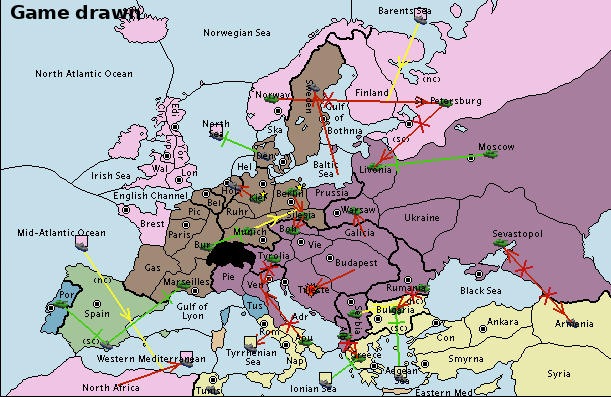
The Nexus Discord server hosted a gunboat Diplomacy tournament in the summer of 2020. As a Patreon patron of BrotherBored, I was looking forward to seeing how well I could implement what I have learned from his blog and Diplomacy Dojo in a tournament setting. I also wanted to put some of my own ideas to the test! The game up for discussion—Nexus Gunboat 2020 game 07—was the first of two concurrent qualifier matches that I played.
I knew I was facing up against a strong roster, highlighted by BrotherBored and his fellow ODC2019 finalist teccles. The tournament rules included:
- A turn limit (Winter 1918)
- The “Tribute” scoring system (in which the player who tops the board gains points from all other survivors based on their final supply center count)
Without further ado, let’s jump into the game!
1) Opening Strategy
I drew Italy, which is a power I considered to be more about choosing a smart strategy to expand over time rather than one that aims at rapid immediate growth. In the current meta, there are two dominant strains of play for Italy: play a Lepanto and attack Turkey, or move west and attack France (the A-tier powers in BrotherBored’s gunboat power rankings).
Before this match, I had recently lost a game as France in which Italy’s opening play impressed me. That Italian player began by threatening Marseilles in 1901 before moving into a full Lepanto setup. After eliminating Turkey, they then had the freedom to send forces west, and I fell to German/Italian pressure. What I understood then from the French perspective is how much less comfortable France feels when Italy is breathing down their neck. If you want to play an eastern strategy as Italy, then I think it is helpful to constrain France at the same time so that France isn’t a solo threat by the time your Lepanto succeeds. Your key unit for this is your army at Venice.
I think most Austrian players understand implicitly that when Italy convoys to Tunis in Fall 1901, the Italian player is willing—in principle—to attack Turkey. So why make a redundant signal of friendship (Venice support hold to Trieste) when you can minimize the chances of France getting three builds (Venice move to Piedmont)? Even if you don’t plan to attack Marseilles until you have the means to conquer it, just having a unit adjacent means France probably won’t risk leaving Marseilles unoccupied for a build. France may be more reticent about attacking England with force if they think their defensive line against Germany could crumble. For this reason, I think moving Venice to Piedmont is the strongest opening move with that unit.[1]Your Bored Brother weighing in here: I reached this conclusion a few years ago after watching the Italian player open this way in The Biggest Game of All Time (look at footnote 1).
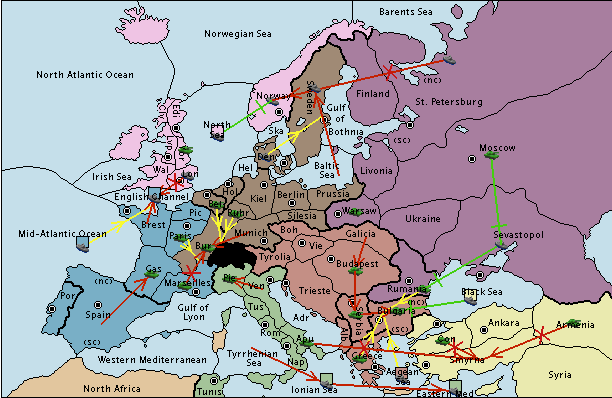
The map above shows the rest of my opening strategy.
Turkey didn’t build a second fleet in 1901 (which usually isn’t wise) and was unprepared to defend against a Lepanto in 1902. However, I decided to delay my attack for a season. The Balkan Gambit (the name for the opening Austria chose) is a well-known and common opening in gunboat, so seeing that opening from the Austrian told me very little about the player’s capabilities or plans.
With Russian armies in Warsaw and Rumania after 1901, I didn’t expect Austria to move Vienna to Tyrolia and Trieste to Venice—but I nevertheless wanted to make it clear to the Austrian that I was wary of a potential attack. When you don’t understand how strong your neighbor is as a player, I think it is reasonable for you to show them early that you don’t intend to be caught off-guard by a stab.
My army in Apulia kept me the option to move back to Venice while I waited to make a claim on Smyrna.
At this point, I had the following plan:
- Take Smyrna
- Try to divide Turkey up with Austria and Russia so that the two remain stuck in conflict afterwards
- Then attack France and try to claim Marseilles and Spain
To understand why my plans changed, turn to the next section.
2) Why I invaded Austria in 1904
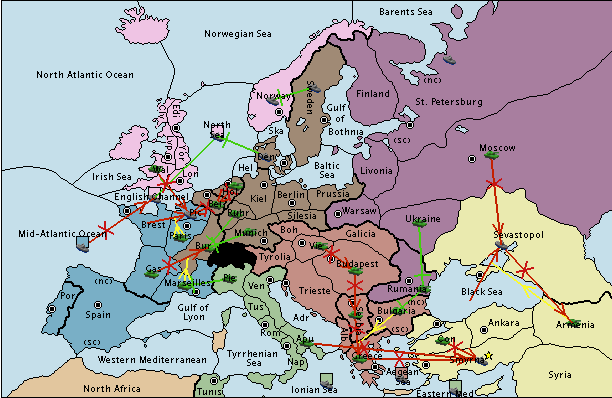
In Fall 1903, Austria managed to alienate me completely with a decision you can see on the map above: Austria tried to convoy into Smyrna, blocking my attack instead of supporting me in! Why would I tolerate Austria’s taking control of Smyrna, locking me completely out of Turkey?!
Keep in mind that Austria has 6 centers here, while I only have 4. With Tribute scoring, I think it is important to try and keep pace with the front runners. I felt frustrated that Austria didn’t understand that they should be helping me grow too. Isn’t that the point of working together? (But then again, this might be my collaborative tendencies shining through.)
There are two usual difficulties for Italy when attacking Austria:
- Making gains beyond Trieste can be difficult, if Austria is safely ensconced in Vienna
- The major benefactor of an Italian-Austrian war is often Turkey
However, I identified a crucial weakness in Austria’s tactics: the Austrian movements were very uni-directional. Because Austria had been moving in such a direct fashion against Turkey with some success (taking Bulgaria and threatening Constantinople), I guessed that Austria would continue in the same direction—and accordingly not take precautions against a sudden Italian push.
With this in mind, we can move to the next image, to see how I attempted to solve these issues simultaneously.
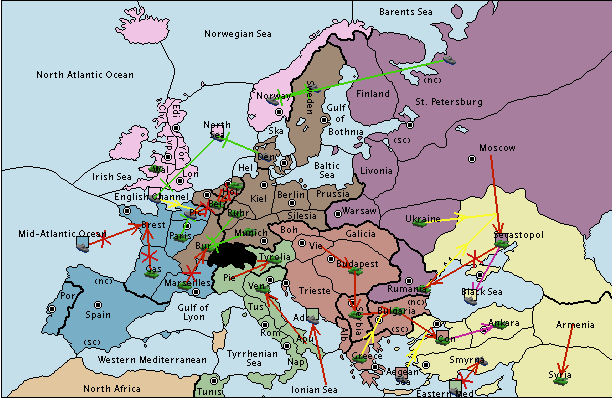
This is the move set I am most proud of from the entire game. By cutting Turkey’s support order from Smyrna, I managed to put Turkey down a supply center while leaving the Austrian armies out of position to defend their home centers.
Austria now had to make a tough decision about whether to hold onto their Turkish gains or pull back to fight my armies. I was hoping that Austria would use Aegean Sea to support-hold Constantinople, which would have weakened Turkey significantly. (However, moving Aegean Sea to Ionian Sea would have been the best defensive move against Italy.)
Austria did not defend well, and ended up being reduced to a Balkan fiefdom by the end of 1905 as Russia and I conquered all of their home centers.
3) Attempting to break the Seven Center Barrier

In Winter 1905, I made a highly committal decision to build two armies in an attempt to break Russia. In his article 5 Reasons I Love to Play as Italy, BrotherBored emphasized that for the Eastern attack to work out for Italy, Italy must keep fleet builds to a minimum. I agreed with the assessment here. If I wanted to build fleets, I would probably have to attack Turkey or Marseilles next, and those centers didn’t seem so likely to fall easily. This left me with only two fleets.
At this point, I was pretty sure that France was BrotherBored (I was right.) and that teccles was Russia (also right.).[2]Your Bored Brother adding another comment: I am impressed and pleased that Erdmundr correctly inferred the identities of some of his most-threatening rivals. I have been teaching players for years that it is not that hard to figure out who specific players are in your matches—even anonymous … Continue reading A rule of thumb I have heard when playing to solo is to ally the weaker players and eliminate the stronger ones (in this case Russia). This is what we see going on in the west too vis a vis France.[3]YBB: The German player said in the postgame chat that they sensed that, I, BrotherBored was France—and for this reason, did not let up attacking me until I was reduced to a non-viable number of centers. I am impressed and pleased to be conquered by a player of such keen senses and strategic … Continue reading
I considered what Turkey might do. It seemed to me that Turkey would naturally want to move Smyrna to Armenia and support Constantinople to Bulgaria with Black Sea. I knew that I could try to contain Turkey by supporting Bulgaria with Greece or moving Ionian Sea to Aegean Sea, but I wanted to exploit the offensive potential of those Turkish orders towards Russia. Also, I didn’t think I could count on Austria to tamely order Serbia and Bulgaria to support-hold each other for the rest of the game.
If the year ended with my army in Serbia (minding that I could retake Vienna if I lost it to Russia in the Spring) and Turkey’s army in Sevastopol, then Russia would be too weak to hold onto Budapest. I would be in a very strong and flexible position for the rest of the game, with multiple directions available for my next captures.
Again following BrotherBored’s advice, I also wanted to completely eliminate a player that I had “backstabbed.” (In my view, Austria slighted me first by claiming Smyrna…but I understood that Austria probably did not see things that way.) I could finish off Austria by supporting myself into Serbia from Greece and sending Adriatic Sea to Albania to block off the retreat path.

As you can see, Russia and Turkey both understood the threat of an Italian snowball, and put aside their differences to stop a common foe (me). I think this was one of the hidden downsides of being so ruthless against Austria early on; I lost the ability to influence the board as much as my orders would usually allow me to.
I can see how another player in my shoes might have chosen to disband the army which retreated from Serbia (in order to rebuild it as a fleet). Perhaps that might have convinced Russia to make a truce with me and attack Turkey. Being perfectly honest, I ordered the retreat on autopilot before thinking it through. At this point I was still trying to win the game, and even with the benefit of hindsight I don’t think a third fleet in this state would have helped me to achieve that. I still had an opportunity to outguess Russia, get a build, and then get that third fleet. So, I stand by my choice despite Turkey later sending all their units in my direction.
However, the limitations of my skill came to light in the next few years. Russia played very patiently and shut down all my attacks, while Turkey slowly reorganized and finally took Greece from me in a case of me being too clever for my own good.
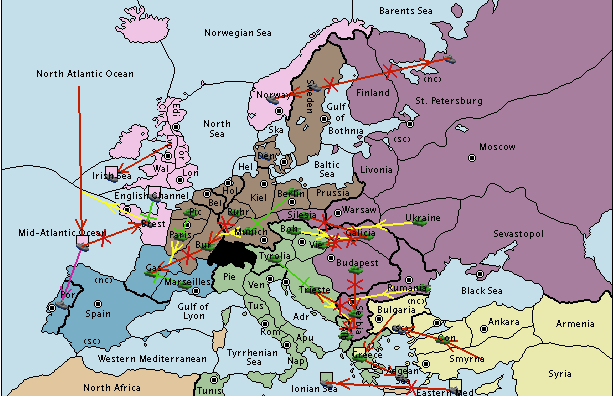
4) The Fine Line of Survival
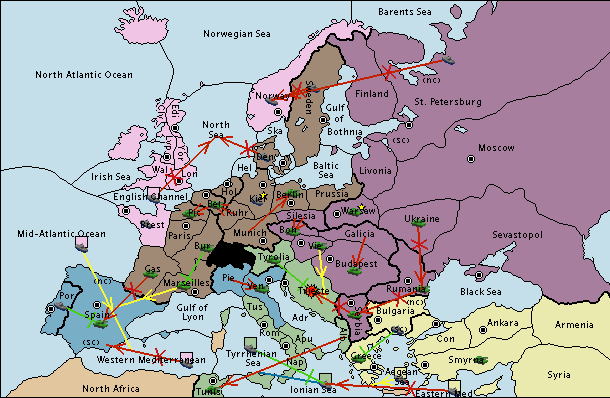
Before the start of 1912, things were looking pretty grim for Italy. My emphasis on holding the line at all costs backfired, as France walked into Venice without compensation. I made the decision to destroy Trieste rather than Tunis because Russia would cut Tyrolia if I tried to make a supported attack on Venice.
At this point, although I felt antagonized and betrayed, I thought I should assess my situation objectively. I pondered the board holistically and considered the specifics of the tournament rules. What was the French player thinking in moving into Venice?
I supposed that the most natural reason for being in Venice is to form part of a stalemate line against Russia, with armies in Piedmont and Venice. I supposed that the second-most-natural reason was to try to eliminate Italy.[4]YBB: My true reasoning was (1) I needed my army to occupy a center to avoid disbanding it, and I needed 3 units if I was to have any hope of regaining my home center Marseilles. (2) I actually forgot that the match would be called in 1918, and was considering a scenario where I might somehow … Continue reading Only one of those reasons offers scope for a future, so I made the choice to play as long as I could in consistency with the former.
I ordered Tyrolia to support Burgundy to Munich, Tyrrhenian Sea support-hold Ionian Sea, and Ionian Sea convoy Tunis to Greece. I figured that if Russia turned on Turkey now (the attack on Greece cutting a support of Bulgaria while also preventing Turkey from rearranging fleets), then the game could end with a Russia board top, a three-center France, and a living Italy. As it turned out, Russia never tried to stab Turkey. France tried to preemptively bounce me in Rome, which cost the French unit its life and whittled me down to two fleets at the same time. Fortunately, that was all I needed.

With two fleets, I was able to force one of them into Tyrrhenian Sea and then sneak into Western Mediterranean Sea (while Turkey attacked in a rather predictable way). This gave me an entire year to move into Spain and hope that one of England and Germany would be so frustrated with cracking France that they would support me in. This worked, and a failed French guess saw me sitting in Spain at the end of 1916.
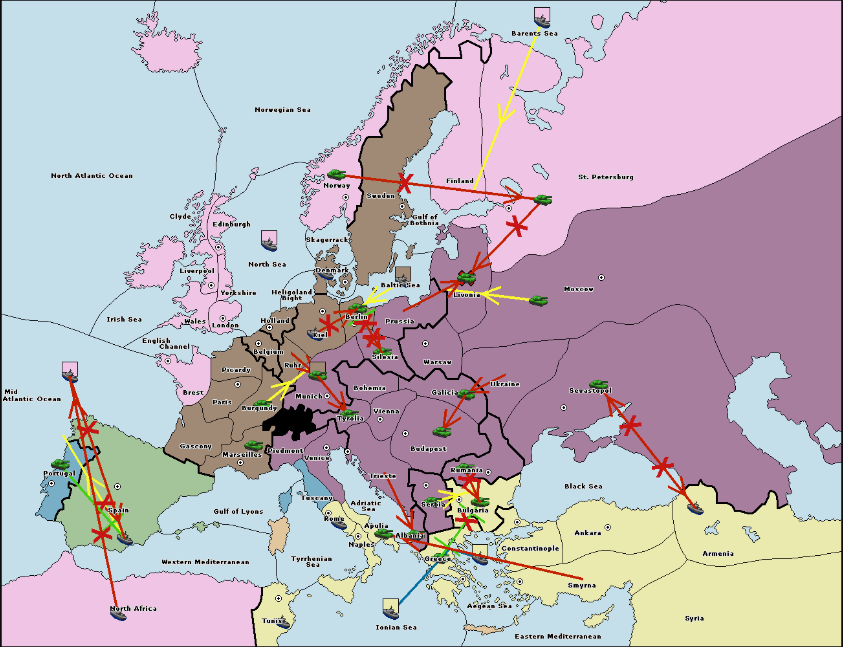
I made a counterintuitive choice in Spring 1917 to support England into Portugal. Superficially, this looks like the wrong tactic since England would be able to later finish me off in Spain. You can see France respecting the mirrored situation by supporting me in Spain, and the French player continued to do so until the game ended after Winter 1917 in an agreed draw.
To help you understand the dynamics behind my decision, let me remind you that the game ends according to the tournament rules in Winter 1918. Let’s go through a few points:
- England’s most natural move, in my opinion, was to move North Africa to Western Mediterranean Sea supported by Mid-Atlantic Ocean. (This mitigates some of my risk.)
- Germany did not want to give England two builds in 1917. So even if Portugal fell, I would survive another year and could perhaps flee to Brest.
- Most importantly, I would be putting skin in the game for the endgame scenario I deemed most likely (given what I saw as optimal play from England.)
Let’s do a mental exercise:
Assume it is Fall 1918, and England did not make it into Spain in Spring 1918. (Germany had an incentive to support England’s unit into Spain to kill Italy and France in order gain a larger survival bonus under the scoring system, but I thought there was a good chance that Germany would not be alert to that, especially if I supported Marseilles in Fall 1917). Assume that England, France, and Italy are rational players who are trying to maximize their score. England has two units targeting Spain, and one unit targeting Portugal. France and Italy are going to support England into the other player’s remaining center. Who will England target? I think the safe decision is for England to attack Spain, because England doesn’t know that the English fleet will be supported into Portugal.
The question to ask yourself in England’s shoes is the following: Does the calculus change when you have seen Italy make the rational move now in Spring 1917 already? Does it mean anything to you that Italy placed their life in your hands then? If it does, my plan succeeds. Bad tactics can be amazing diplomacy in the right circumstances.
If You Want to Read More…
For a more in depth look at my thoughts during the game, you can download my entire game notes here!
I recommend scrolling through the game maps on webDiplomacy alongside my notes (as these notes have not been edited for clarity).
Thank you, readers for your time and patience—and thanks again to BrotherBored for offering me this collaboration option and platform to showcase a great, well-fought game!
Footnotes
| ↑1 | Your Bored Brother weighing in here: I reached this conclusion a few years ago after watching the Italian player open this way in The Biggest Game of All Time (look at footnote 1). |
|---|---|
| ↑2 | Your Bored Brother adding another comment: I am impressed and pleased that Erdmundr correctly inferred the identities of some of his most-threatening rivals. I have been teaching players for years that it is not that hard to figure out who specific players are in your matches—even anonymous gunboat matches—as long as you know the starting roster. Players’ personalities and capabilities are evident in just a few years. A childhood friend of mine (who has played games with me for decades) once told me “I can tell which country you are by the end of 1902.” |
| ↑3 | YBB: The German player said in the postgame chat that they sensed that, I, BrotherBored was France—and for this reason, did not let up attacking me until I was reduced to a non-viable number of centers. I am impressed and pleased to be conquered by a player of such keen senses and strategic insight. |
| ↑4 | YBB: My true reasoning was (1) I needed my army to occupy a center to avoid disbanding it, and I needed 3 units if I was to have any hope of regaining my home center Marseilles. (2) I actually forgot that the match would be called in 1918, and was considering a scenario where I might somehow recover and revive my chances. Also, I wanted to turbo-charge Russia so that Germany would prioritize fighting Russia over finishing me off. |
